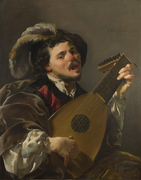Shakespeare 400 in Music
Thursday, April 21, 2016

Around the world, playwrights, thespians, and lovers of English literature are celebrating William Shakespeare (1564-1616), who died 400 years this Saturday. (His 452nd birthday is next Tuesday.) The Bard left us a legacy that is treasured worldwide and he works still inspire music to this day.
With just one exception, each of Shakespeare’s plays mentions music in the stage directions, whether “a flourish of trumpets,” a “Danish march,” or a “song fragment,” to take three of the dozen or so musical references in Hamlet listed in Gooch and Thatcher’s A Shakespeare Music Catalogue. In the First Folio, music is mentioned in some form or another over 100 times, but little is actually known about this music or what exactly was played. One significant manuscript from around the time is Add.10444 at the British Library (GB-Lbl), copied around 1625, nearly a decade after Shakespeare’s death. In this collection of instrumental music, the masques, suites, dances, and fanciesare short (166 pieces on around 60 folios) and give us an idea of what might have been heard on the stage.
In the RISM database, Shakespeare typically functions as the author of the source material or the author of the text. To find him, do an Advanced Search and select the field Other names:

Shakespeare’s influence can be traced among the 400+ sources in RISM for not only operas (which is perhaps the most straightforward way to musically adapt a play) but also incidental music and stage music, songs and lieder, choruses, overtures, marches, odes, and symphonies. Thirteen of these have been digitized and are available online.
If you sort the results by Title (and while you’re at it, let yourself view 100 results at a time)…

…you’ll undoubtedly recognize some of the more familiar plays (with some linguistic variations): Antony and Cleopatra, As You Like It, Hamlet, Julius Caesar, Macbeth, A Midsummer Night’s Dream, Romeo and Juliet, and on and on. Sources for some of the more famous Shakespeare music are in RISM, such as Hector Berlioz’s Béatrice et Bénédict and autograph fragments to Roméo et Juliette, Giuseppe Verdi’s Macbeth and Otello, Henry Purcell’s incidental music, and Felix Mendelssohn Bartholdy’s Ein Sommernachtstraum.
Shakespeare’s name turns up in the titles of a handful of pieces, attesting to his influence in the century following his death. (Search Shakespeare in the field Title). Here you’ll find “An Ode upon dedicating a building to Shakespeare” by Thomas Augustine Arne (1710-1778), “Arise immortal Shakespeare” by William Boyce (1711-1779), and “Ode on the spirits of Shakespeare” by Thomas Linley (1756-1778).
As the world commemorates Shakespeare 400 with exhibitions, films, performances, and concerts, you can use RISM to seek out the original sources that have contributed to his legacy.
Image: Hendrick ter Brugghen (1588 - 1629), “A Man playing a Lute” (1624). Photo © The National Gallery, London. RIdIM 395.
Share Tweet EmailKategorie: Jubiläen

